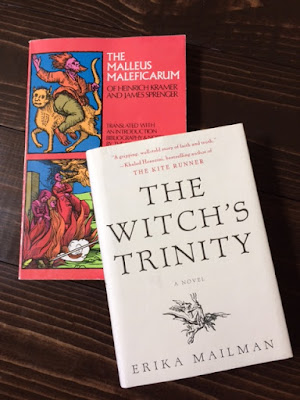 |
| Modern edition of Malleus has a demon riding backward and a witch being burned at the stake. My novel shows a similar demon on the cover. |
In
the very fun movie The House with a Clock in its Walls (based on the
classic novel by John Bellairs, which I loved as a child), the warlock
character Jonathan Barnavelt starts searching for books to help out in a bad
situation. One of the books he's trying to find is the Malleus Maleficarum, an
actual book that is known as the Witch Hunter's Bible.
It
was written in/around 1486 by two German inquisitors, Heinrich Kramer and James
Sprenger, who were wandering through Northern Germany to help towns with their
witchcraft problems.
The
title translates to "the Hammer of Witches"—i.e., the weapon which
you can use to hammer them down—you can see the root of "mallet" in
"malleus."
 |
| Original cover of the Malleus Maleficarum |
The
book was written to assist if the two friars couldn't happen to be there in
your village at the time a witch was ruining everything for everybody else.
Says translator Montague Summers, "The Malleus lay on the bench of
every judge, on the desk of every magistrate. It was the ultimate, irrefutable,
unarguable authority."
This book is still in print today.
It discusses the things witches do (just flipping through, I am seeing
chapter headings like, "How they are Transported from Place to Place"
and "Here Followeth how Witches Injure Cattle in Various Ways"), how
to question them, and how to pass sentence on them. It contains very legal
language and is deadly serious in its pragmatic approach to an otherworldly
crisis. The language in the sentencing parts is actually so legalistic
and long-winded that I hesitate to include an excerpt!
 |
| In this 1591 woodcut, witches bring children to the devil. |
The
book lays out 35 kinds of questions to put to a witch. Here's the heading for
Question 34: "Of the Method of passing Sentence upon a Witch who Annuls
Spells wrought by Witchcraft; and of Witch Midwives and Archer-Wizards."
It's
like The Handmaid's Tale meets Dungeons and Dragons. The witch midwives
"surpass all other witches in their crimes" and the archer-wizards
(as in, archery) "constitute the graver danger to the Christian religion
in that they have obtained protection on the estates of nobles and Princes who
receive, patronize and defend them." Archer-wizards enchant weapons so
they don't work right, while witch-midwives either kill the child in the womb
or offer up the newborn to the devil (an example of this is seen in the woodcut above).
The
book is a lightning bolt of shocking entry into the superstitious, ignorant
medieval world. In my novel The Witch's Trinity, set in Germany during
this time period, an elderly woman is so indoctrinated in this cultural mindset
that when she is accused of witchcraft, she isn't completely sure if she's
innocent.
As
I continue to flip through my copy of the Malleus, I see passages I
highlighted just because they blew my mind, and handwritten marginal notes
where I had to vent. In a random flip-through, here is a pretty interesting
section:
"An example was brought to our notice as Inquisitors. A town was once rendered almost destitute by the death of its citizens; and there was a rumour that a certain buried woman was gradually eating the shroud in which she had been buried, and that the plague could not cease until she had eaten the whole shroud and absorbed it into her stomach."
Yikes,
rumours can be so vile! Hungry corpses are the worst!
If
you're curious how it ended, the city's governor caused her to be dug up. The
Podesta (an Italian official) cut her head off with his sword, "and at
once the plague ceased." This anecdote is compelling not only for its
eerie image of the woman eating fabric in her grave, but also because her
exhumation was official and endorsed by the highest levels of city government.
If
you're wondering why calmer heads didn't prevail, the very first part of the Malleus
establishes that not believing in witchcraft constitutes heresy. So, to save
your own skin, you'd become a believer, too.
I
hope you've enjoyed this look at the very, very dark recesses of medieval
justice. And hey: please vote in November!
*Note:
as of this writing (Oct. 30, 2018), The Witch's Trinity ebook is on a Book Bub
sale for $1.99 until Nov. 4. It is that price across all platforms (Kindle,
Nook, Google Books, Kobo, etc.). Here are the links:
“A gripping, well-told story of faith and truth” (Khaled Hosseini, author of The Kite Runner): When a small German town falls on hard times, the townspeople blame
witchcraft — and an elderly woman whose mysterious visions leave her questioning what’s real… “Beautifully written” (San Francisco Chronicle).
Amazon
https://r.bookbub.com/et_active_check/83319?affiliate_batch=0&affiliate_label=a&affiliate_variant=author_deal_alert&mailing_id=25233®ion=1&retailer_id=1&subscriber_id=15064178
Barnes & Noble
https://r.bookbub.com/et_active_check/83319?affiliate_batch=0&affiliate_label=a&affiliate_variant=author_deal_alert&mailing_id=25233®ion=1&retailer_id=2&subscriber_id=15064178
Apple iBooks
https://r.bookbub.com/et_active_check/83319?affiliate_batch=0&affiliate_label=a&affiliate_variant=author_deal_alert&mailing_id=25233®ion=1&retailer_id=3&subscriber_id=15064178
Google
https://r.bookbub.com/et_active_check/83319?affiliate_batch=0&affiliate_label=a&affiliate_variant=author_deal_alert&mailing_id=25233®ion=1&retailer_id=4&subscriber_id=15064178
Kobo
https://r.bookbub.com/et_active_check/83319?affiliate_batch=0&affiliate_label=a&affiliate_variant=author_deal_alert&mailing_id=25233®ion=1&retailer_id=5&subscriber_id=15064178
 |
| Photo credit: Petra Hoette |
Links:
Erika's
website: http://erikamailman.com/writing/the-witchs-trinity/
Erika's
blog: http://erikamailman.blogspot.com/
Random
House: http://bit.ly/2BZrJf4
Amazon:
https://amzn.to/2pCdjdm
Barnes
and Noble: http://bit.ly/2dpMYKc
Follow
Erika on Twitter: @ErikaMailman
and
on Instagram: @ErikaMailman
. .
. .
